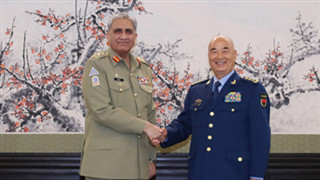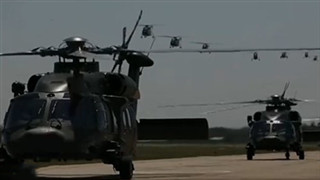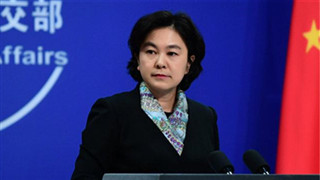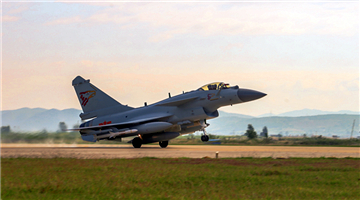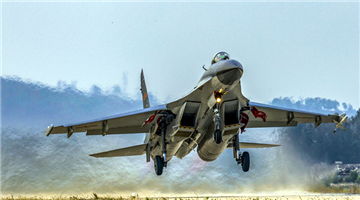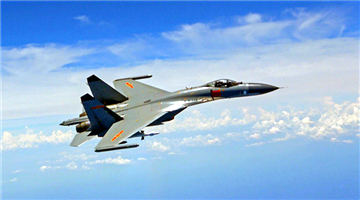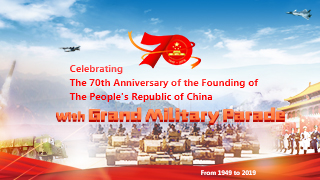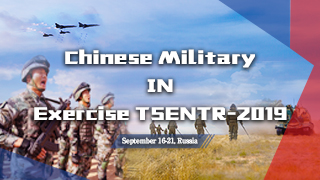
Military truck convoy drove in formation during the Central-2019(Tsentr-2019) strategic exercise in Orenburg, Russia and other places.
By Ji Cheng
A few days ago, General Joseph F. Dunford, Jr., Chairman of the US Joint Chiefs of Staff and the US’ highest-ranking military officer, expressed concerns about NATO’s loss of military superiority to Russia during the NATO’s Military Committee meeting. This has raised great attention around the world.
With the increasingly comprehensive and systematic understanding of Russia’s security, the US-led military alliance is trying to get prepared for responding to the so-called "challenges from Russia" in terms of nuclear deterrence, conventional military conflict and confrontation, as well as the "grey zone" operation between war and peace. This is just to strengthen its containment over Russia.
As for the conventional military, the defense ministers of NATO countries have formulated a new strategy toward Russia as early as May this year. Gen. Dunford pointed out that the purpose of the new military strategy is to align NATO's overall strategic planning with the collective efforts of member states to expand their capabilities.
In terms of specific practices, NATO has recently increased its efforts to contain Russia in key waters and airspace like the Baltic Sea, and repeatedly encountered Russian warplanes over the Baltic sea, which have even affected a special plane carrying Russian Defense Minister Sergei Shoigu.
In addition, the US side has also expressed doubts about NATO's capabilities in new fields of operation, and meanwhile vigorously made up for its shortcomings in carrying out "hybrid" wars in the so-called "grey zone".
While strengthening its own military strength and enhancing its ability to contain Russia, NATO and Russia have maintained relatively smooth channels of dialogue and communication to avoid direct conflict or confrontation due to military misjudgment.
It should be said that Gen. Dunford, Chairman of the US Joint Chiefs of Staff, mainly based on the following two considerations in expressing his concerns that NATO has lost its military superiority to Russia at this very time:
On the one hand, this is the response of the US-led NATO to the current regional and international security situation. As the world's top two countries possessing nuclear weapons, the US and Russia have withdrawn from the Intermediate-Range Nuclear Forces (INF) Treaty this year, the international strategic security and stability is at the risk of full oscillation.
Over the past decade or so, conventional military frictions and confrontations between NATO and Russia in Central and Eastern Europe and the Middle East have become increasingly fierce. These subtle but important changes have prompted the major NATO member states to once again focus their attention on Russia as an external traction factor to strengthen their own collective defense construction.
On the other hand, the US hopes to bridge the differences among the parties in NATO, consolidate security consensus, and rebuild the US credibility and prestige within the bloc. As it’s known to all, US President Donald Trump has always complained about NATO's European allies from the beginning of his term, accusing them of spending little on defense. In addition, there are also significant differences between the two sides on such issues as trade, energy and climate change.
In order to restore its relationship with European allies and further consolidate the security consensus, the US Congress invited NATO Secretary General Jens Stoltenberg to deliver speeches to both the Senate and the House of Representatives for the first time this April, to show the US consistent and universal support to NATO.
In this regard, Stoltenberg also sent a positive signal to the US in a timely manner, saying that public discussion and opinion differences do not necessarily mean showing weakness; instead, it’s an embodiment of power. The existence of NATO is in the interest of all member states.
In addition, the US has also born a grudge against some NATO member states represented by Germany and Turkey, and the NATO framework is in need to improve their relations. The US has previously warned Germany that it might become a "captive" of the Russian economy due to its purchase of Russian natural gas.
The US has even threatened to expel Turkey from the NATO alliance for its purchase of the Russian-made S-400 air defense missile system. If the US fails to gain the understanding and support of the two countries, Germany and Turkey, as the most important economy in Europe and the only member of NATO in the Middle East respectively, in the defense field, it will be hard for the US to realize its established defense objectives in Europe and the Middle East.
Regardless of the US excuses to strengthen NATO's capabilities to enhance its containment over Russia, NATO's future, in the final analysis, depends to a large extent on whether the US can timely correct its foreign policy deviation caused by the "American first" concept, and get out of the Cold War mentality and zero-sum game mentality.
While taking into account the important interests of other member states, the US is supposed to carry out positive and fruitful dialogue with Russia. Otherwise, peace and stability in Eurasia will only become an empty talk.
(The author is with the Foreign Military Studies Department under the PLA's Academy of Military Sciences)
